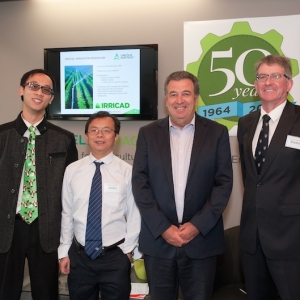Wired for Science: Understanding the feeding habits of mealybug
Fussy children might be frustrating, but fussy mealybugs could help protect the New Zealand wine industry from grapevine leafroll-associated virus 3.
 From left Dr Paul Cheng (LU), Dr Xiaopeng Huang (Yili), Peter Barrowclough (Lincoln Agritech Ltd), Shane Lodge (Oceania Dairy).
From left Dr Paul Cheng (LU), Dr Xiaopeng Huang (Yili), Peter Barrowclough (Lincoln Agritech Ltd), Shane Lodge (Oceania Dairy).
Lincoln University hosted senior management from both Inner Mongolia Yili Industrial Group and its subsidiary Oceania Dairy last week.
The purpose of the visit was to begin discussions and build on the Memorandum of Understanding (MOU) between Lincoln University and Yili, signed in 2014.
Dr Xiaopeng Huang, deputy director of Yili's Innovation Centre, and Shane Lodge, quality and compliance manager of Oceania Dairy, headed the group.
Talks covered a range of topics, with a particular emphasis on value chains. The visit also included presentations and demonstrations on Lincoln University's 'paddock to plate' research.
"The outcomes from discussions held with key departments within Lincoln were extremely encouraging and revealed that the organisations are very much in tune regarding preferred outcomes from the MOU," says Lincoln University business development manager, Samuel Yu.
"We both share similar ambitions concerning the dual challenge of raising productivity and reducing environmental impacts through precision agri-technologies and on-farm best practice, as well as a shared desire to explore ways to enhance brand value via food safety and the development of new high-nutrition products.
"These topics are very much in the hearts and minds of consumers when they purchase foods; not just in China or New Zealand, but all over the world."
"We're extremely pleased to be working with a world leading food manufacturer such as Yili, and we see it as recognition of Lincoln University's global relevance as an important player in the primary sector," says Yu.
Pan Gang, chairman of Yili Group and the Vice-Chancellor of Lincoln University, Dr Andrew West signed MOU in front of President Xi Jinping of China and Prime Minister John Key, during the President's visit to New Zealand in November 2014.
Following a side-by-side rolling into a gully, Safer Farms has issued a new Safety Alert.
Coming in at a year-end total at 3088 units, a rise of around 10% over the 2806 total for 2024, the signs are that the New Zealand farm machinery industry is turning the corner after a difficult couple of years.
New Zealand's animal health industry has a new tool addressing a long-standing sustainability issue.
The Government has announced that ACC will be a sponsor of this year's FMG Young Farmer of the Year competition.
As veterinary student numbers grow to help address New Zealand's national workforce shortge, Massey University's School of Veterinary Science is inviting more veterinary practices to partner in training the next generation of vets.
South Island dairy farmers will soon be able to supply organic milk to Fonterra.